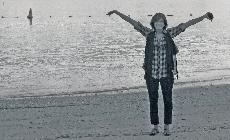
(Madhuri Vijay)
Madhuri Vijay ’09 was one of 40 national recipients of a $28,000 fellowship from the Thomas J. Watson Foundation. The grant supports a year of independent study and travel outside the United States to research a topic of the student’s choosing. Vijay, who hails from Bangalore, India, is currently using her fellowship to visit different parts of the world and explore the lives of Indians like herself who have left their motherland behind. This is the third installment in a four-part series that will document her travels.
“Welcome to Paradise,” said the sign at Mauritius’ Plaisance Airport. Thank you, I said to the sign, and then proceeded to spend my first half hour in paradise arguing with a mustachioed immigration officer that merely because I hadn’t bothered to book a hotel ahead of time didn’t mean he needed to deny me entry into the country.
“You need to give me an address before I can issue a visa,” he said firmly.
“I will probably stay at the YMCA,” I ventured, though I had no idea whether Mauritius had a YMCA. It sounded like a pretty safe bet, though, and I hoped he’d buy it.
“YMCA?” He frowned. “What’s that?”
Oh, no. “It’s, um, the Young Man’s Christian Association?”
He stared at me, obviously trying to assess whether I was a man or a Christian, and when he decided I wasn’t either, he shook his head.
“Come with me,” he said.
He marched me down the corridors of the airport, past startled security guards and customs officers. I felt like one of those shady criminals who gets caught trying to smuggle wide-eyed dolls stuffed full of marijuana through airport security, and I started planning my heroic escape, imagining a Jason Bourne-esque chase that ended with my fleeing down the runway and catching hold of the retracting wheels of a plane headed for Myanmar. Where, hopefully, they wouldn’t need a hotel address in order to issue me a visa. Because then I’d really be in trouble.
The immigration officer, however, stopped me in front of the tourist information booth and asked me to book a hotel, right there in front of him. I picked the cheapest one without hesitation. After this was done, he walked me back to the immigration desk and stamped my passport.
“Don’t you know anyone in Mauritius?” he asked, almost plaintively, as he handed it back to me.
“I know one person,” I said. “Well, I don’t know him, really. I’ve just talked to him once on the phone. I think he used to be the Vice-President.”
He looked at me for a long moment, his face full of regret that he had allowed an inveterate liar and certified loony into his country – though I wasn’t lying or crazy: I really did have the number of the former Vice-President – and then waved me on.
That was the beginning of my week in Mauritius. It wasn’t exactly auspicious, and I was slightly worried that I wouldn’t be able to meet anyone, that my project wouldn’t take off. One week, after all, is not a great deal of time. But the next morning I found myself sitting across from the former Vice-President, asking him questions about the position of Indians in Mauritian society.
In the afternoon, I sat in an air-conditioned room, observing a meeting of poets and writers who belong to the President’s Fund for Creative Writing, a special fund that seeks to encourage young Mauritian writers writing in English. And still later, I found myself in the town of Curepipe, having been invited to dinner at the house of one of the members, playing with their adorable dog and eating fantastic Indo-Mauritian food. I wished, triumphantly, that the immigration officer from the airport could see me now.
It was an incredible week. I met with all kinds of people about my project, a professor at the Mahatma Gandhi Institute, the owner of an Indian bookstore, the Indo-Mauritian director of the national broadcasting corporation, the author of a forthcoming book on the Indian diaspora, the manager of the historical site where indentured Indian labourers, brought over in the 1800s to work in the Mauritian sugarcane fields, first landed.
I was so caught up in my work that it was only the night before I left the country that I realized I hadn’t actually explored Mauritius itself. I hadn’t sunbathed on the beaches, hadn’t visited the markets, hadn’t seen the tourist sights, hadn’t heard the famous sega music, hadn’t sampled the local food – hadn’t done all the things that people come to Mauritius to do.
But I had done other things, I told myself: I had met its people, had eaten at their homes, had laughed with their children. Surely that counted for something? Nevertheless, I fell asleep with a strange fear that I had somehow misspent my week in Mauritius; when would I ever have the chance to come back?
My flight left at 8:30 a.m., so at 6 a.m. a new friend of mine picked me up to drive me to the airport. No negotiating with taxi drivers this time. We whizzed down the narrow, impeccably maintained roads, the sugarcane thick and green on either side, forming a verdant tunnel. The hills, silhouetted against the pale sky, seemed taller than usual. The sun was rising, slowly, tinges of pink touching the edges of the horizon. I stared out of the window, thinking how strange it was that I could fall in love with a place in the span of a week, without even having actually seen any of it.
“You know,” I said musingly, “I haven’t even been to the beach. Isn’t it ridiculous, to say you went to Mauritius, the paradise island, and left without seeing the ocean?”
My friend glanced at me. “What’s the time?” he said.

(Madhuri Vijay)
